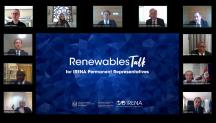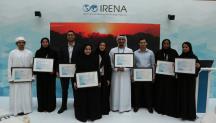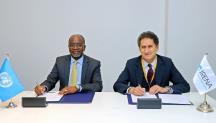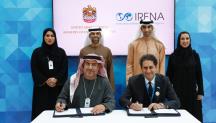

IRENA Director-General Meets with UAE Vice President
Newsletter
Since winning the bid to host the International Renewable Energy Agency in 2009, the United Arab Emirates has been a strong supporter of the Agency and has made considerable strides in achieving domestic renewable energy ambitions. The UAE is actively pursuing the development and deployment of renewables, and an IRENA REmap assessment (PDF) suggests the country could save billions of dollars annually by switching from fossil fuels to renewables.
On 1 August 2016, His Highness Sheikh Mohammed bin Rashid Al Maktoum, Vice President and Prime Minister of the UAE and Ruler of Dubai, visited IRENA’s headquarters to show his support for the agency and engage with IRENA Director-General Adnan Z. Amin on the Agency’s achievements.
“The UAE has become a trendsetter in renewable energy deployment and Dubai has played a key role in making that happen, under the leadership of His Highness Sheikh Mohammed Bin Rashid,” said IRENA Director-General Adnan Z. Amin.
Mr. Amin expressed gratitude to the UAE for its role in contributing to IRENA’s success, calling it a reflection of the UAE’s renewable energy leadership, and presented the Sheikh with a painting of the IRENA Headquarters.

Big Influencers
HH Sheikh Mohammed was accompanied by Dr Sultan Al Jaber, UAE Minister of State and Chairman of Masdar. The two leaders are influential in the local and international renewables scene, pushing for the deployment of solar power and supporting projects like Solar Impulse 2, the world’s first globe-circumnavigating solar plane.
“The UAE recognizes that an essential component for the further development of renewable energy will be the empowerment of government agencies to take a holistic approach to energy regulation,” Mr. Amin said.
Under Dubai’s Clean Energy Strategy 2050, launched in late 2015, the emirate aims to have renewable energy compose 7 per cent of its total energy output by 2020, and 25 per cent by 2030, by focusing on a five pillared strategy: building infrastructure, enacting legislation, providing funding, building capacities and skills, and creating an environment friendly energy mix.
Implementation of the strategy is already well underway, and last May the third phase of the Mohammed Bin Rashid Al Maktoum Solar Park, currently under development, broke the world record for the cheapest solar power in the world, at 2.99 cents per kilowatt-hour — cheaper than coal and gas-fired generated electricity in the UAE.




